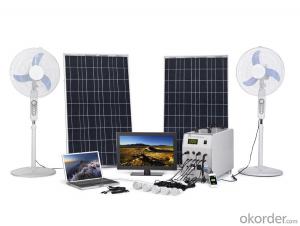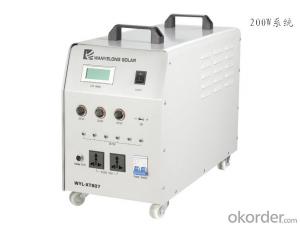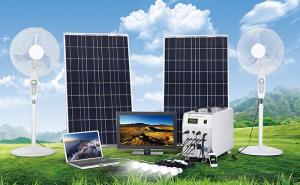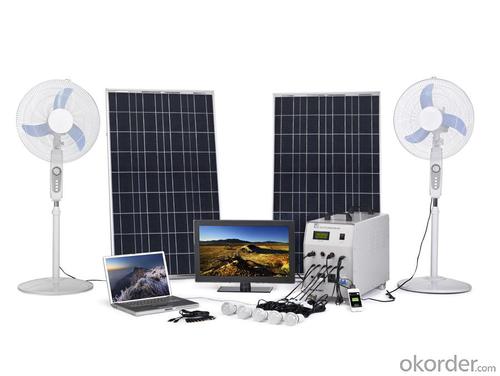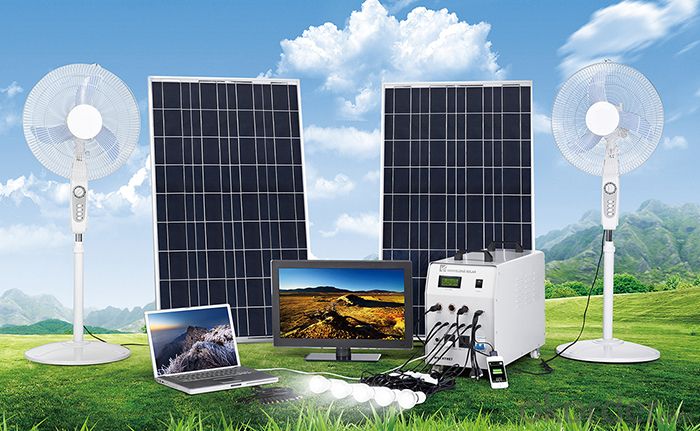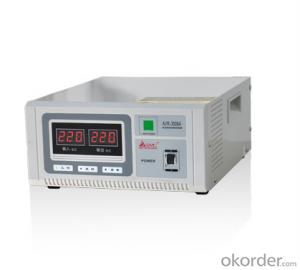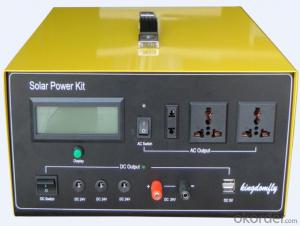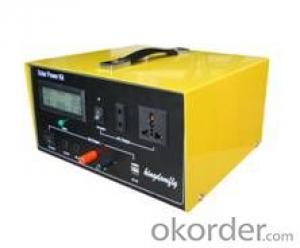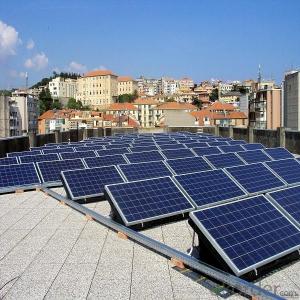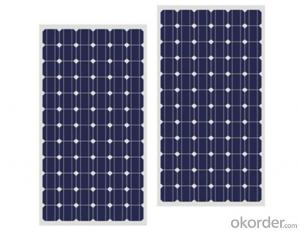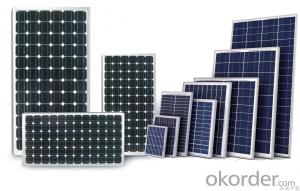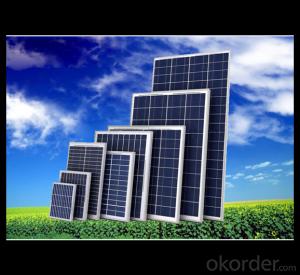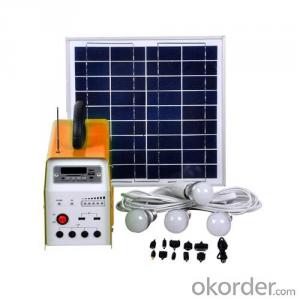Domestic Solar Energy Systems - AC >200W Solar Power System
- Loading Port:
- Guangzhou
- Payment Terms:
- TT OR LC
- Min Order Qty:
- 20 set
- Supply Capability:
- 10000 set/month
OKorder Service Pledge
OKorder Financial Service
You Might Also Like
Light up 4-6 rooms at the same time,with mobile phone charge function,power DC fan,DC TV,Laptop,AC TV,Computer
●Installation,all-in-one DIY Kit;
●5m light cable-with on/off switch;
●Mobile phone charge-for different phones;
●Power Supply-solar or AC adapter;
●Protection-overcharge and over-discharge;
●Pure sine wave inverter built in.
Part | Specification | Qty | |
Solar panel | Poly crystallione type with 10m cable | 100W | ×1 |
Power box | Lead acid rechargeable battery | 55AH/12V | ×1 |
PWM charge controller | 10A/12V | ×1 | |
Pure sine wave inverter | 300W | ×1 | |
AC Output | 220V/110V 50/60Hz | ×1 | |
Cigarette lighter socket output | DC12V | ×2 | |
DC output port | 12V | ×4 | |
USB charge output | 5V | ×1 | |
Others | DC12V LED bulb | 3W | ×4 |
Light holder with 5m cable | On off switch | ×4 | |
USB charge cable | 10 in 1 | ×1 | |
Solar panel mounting bracket | Angle adjustable | ||
DC floor fan (not included) | 15W/12V | ×2 | |
DC TV (not included) | 15inch 30W12V | ×1 | |
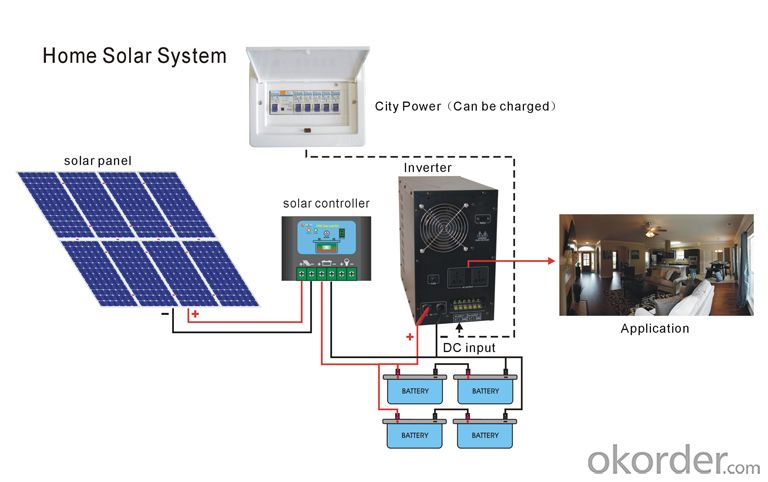
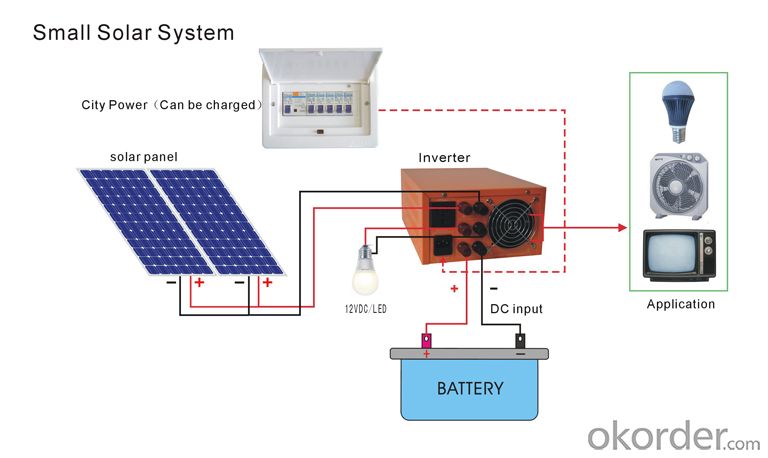
Quantuty
Quality goal:Constant innovation to meet the request of the customers. Protect the environment, provide environmental products to customer.
Quality strategy:
Quality: established high efficiency quality manager system in line with ISO9001 and ISO/TS16949.
Improvement: keeping improvement & quality guarantee.
Efficiency: delivery on time, complete the agreed events with the customers on time.
Service: focus on customers, provide the service and technology support on time.
FAQ
1. How long will my inquiry get response?
Your inquiry related to our products or prices will be replied within 24 hours.
2. Can I get professional service and suggestion?
Well-trained and experienced staffs to answer all your questions in fluent English.
3. Do you accept OEM or customized design?
OEM & ODM, any your customized lightings we can help you to design and put into product.
4. What if I need specific design?
Distributorship are offered for your unique design and some our current models.
- Q: What is the impact of dust and dirt on the performance of solar panels?
- Dust and dirt can significantly impact the performance of solar panels. When accumulated on the surface of the panels, they can reduce the amount of sunlight reaching the photovoltaic cells, thereby decreasing the overall energy production. Dust and dirt particles can also create shading, which further reduces the panel's efficiency. Regular cleaning and maintenance are necessary to ensure optimal performance and maximize the energy output of solar panels.
- Q: Can solar energy systems be used in areas with high levels of wildlife activity?
- Yes, solar energy systems can be used in areas with high levels of wildlife activity. However, proper measures should be taken to minimize any potential negative impacts on wildlife. This can include designing and installing systems that are bird-friendly, using wildlife-friendly fencing, and ensuring that the installation site does not disrupt important wildlife habitats or migration routes. Additionally, regular monitoring and maintenance can help identify and address any issues that may arise to ensure the coexistence of solar energy systems and wildlife.
- Q: Can solar energy systems be used in powering green hotels or eco-resorts?
- Yes, solar energy systems can definitely be used to power green hotels or eco-resorts. Solar panels can be installed on the roofs of buildings or in nearby areas to generate electricity from the sun's rays. This renewable energy source helps reduce the carbon footprint of these establishments by reducing reliance on fossil fuels. Additionally, solar energy systems can also provide hot water for showers and pools, further enhancing the sustainability of these eco-friendly accommodations.
- Q: Can solar energy systems be used in mining operations?
- Yes, solar energy systems can be used in mining operations. Solar power can provide a sustainable and reliable source of electricity for various mining activities, such as powering equipment, lighting, ventilation, and processing plants. It reduces dependence on traditional fossil fuel-based energy sources, lowers operational costs, and minimizes environmental impacts. However, the feasibility and effectiveness of solar energy systems in mining operations depend on factors like location, energy demands, and technical considerations.
- Q: How do solar energy systems impact water quality?
- Solar energy systems have a minimal impact on water quality compared to other sources of energy. Unlike fossil fuels, solar power does not release harmful pollutants or contaminants into water sources during electricity generation. However, water is still required for the production of solar panels, and if not managed properly, the extraction of materials and manufacturing processes can have some localized impacts on water quality. Overall, the impact of solar energy systems on water quality is significantly lower compared to traditional energy sources.
- Q: Are solar energy systems expensive to install?
- Solar energy systems can be initially expensive to install, but they offer long-term cost savings and potential return on investment through reduced energy bills and government incentives.
- Q: Are there any risks of electrical hazards during installation or maintenance of solar energy systems?
- Yes, there are risks of electrical hazards during the installation or maintenance of solar energy systems. Solar energy systems involve working with high-voltage DC (direct current) electricity, which can pose dangers if not handled properly. Some of the potential risks include: 1. Electrocution: Solar panels generate electricity, and if not isolated or disconnected properly, there is a risk of electrocution for individuals working on the system. 2. Fire Hazards: Faulty wiring, loose connections, or improper installation can lead to electrical arcs and sparks, which can ignite a fire if proper precautions are not taken. 3. Falls and Injuries: Solar panels are typically installed on rooftops, which may involve climbing ladders, working at heights, and handling heavy equipment. If not done with caution, it can result in slips, falls, or injuries. 4. Arc Flash: When working on live electrical equipment, there is a risk of arc flash, which is a sudden release of energy that can cause severe burns, hearing damage, and even death. 5. Environmental Risks: While not directly related to electrical hazards, it is essential to consider potential environmental risks during the installation of solar energy systems. For instance, improper disposal of hazardous materials used in solar panels, such as lead, cadmium, or other toxic substances, can harm the environment if not handled correctly. To mitigate these risks, it is crucial to follow proper safety protocols and guidelines during the installation and maintenance of solar energy systems. This includes wearing personal protective equipment (PPE), ensuring proper grounding and isolation procedures, using insulated tools, and following all local electrical codes and regulations. It is also recommended to hire trained and certified professionals for the installation and maintenance to minimize the risks associated with electrical hazards.
- Q: How long does it take to install a solar energy system?
- The time it takes to install a solar energy system can vary depending on various factors such as the size and complexity of the system, the availability of equipment and materials, and the experience of the installation team. Generally, a residential solar energy system installation can take anywhere from a few days to a few weeks, while larger commercial installations may take several weeks or even months. It is recommended to consult with a professional solar installer to get a more accurate estimate based on your specific requirements.
- Q: Can solar energy systems be used for heating and cooling a home?
- Yes, solar energy systems can be used for heating and cooling a home. Solar panels can harness the sun's energy to generate electricity, which can then be used to power heating and cooling systems such as solar water heaters and air conditioners. Additionally, passive solar design principles can be incorporated into the architectural design of a home to maximize natural heating and cooling through strategic placement of windows, insulation, and thermal mass.
- Q: How do solar energy systems affect water conservation?
- Solar energy systems can contribute to water conservation by reducing the need for water-intensive energy sources such as coal or nuclear power. Unlike these traditional energy sources, solar power does not require large amounts of water for cooling or steam generation, thus minimizing the strain on water resources. Additionally, solar panels do not produce any harmful emissions, reducing pollution in water bodies and safeguarding aquatic ecosystems. By transitioning to solar energy systems, we can mitigate water scarcity and promote sustainable water management practices.
Send your message to us
Domestic Solar Energy Systems - AC >200W Solar Power System
- Loading Port:
- Guangzhou
- Payment Terms:
- TT OR LC
- Min Order Qty:
- 20 set
- Supply Capability:
- 10000 set/month
OKorder Service Pledge
OKorder Financial Service
Similar products
Hot products
Hot Searches
Related keywords
